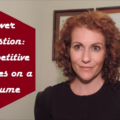While out with a dear friend and fellow recruiter, Rebecca, our conversation turned to recruiting – as it usually does. While talking shop, we brainstormed vlog ideas and she suggested I address the issue of when to apply for a job. Rebecca spoke of the study which underscored the fact that women only apply for roles in which they satisfy 100% of the requirements, whereas men will apply to roles for which they satisfy only 60% of the requirements. So which is the best approach? My recommendation is to stick to the 80-20 rule: if you satisfy 80% or more of the requirements, it would be appropriate to apply for the role.
It is important that you understand the job description. Job ads will have the role description, list of job duties, and the list of requirements. In some cases, the requirements will be split out by mandatory requirements and nice to have requirements. In other cases, the must have and nice to have requirements may not be clearly stated. The most critical duties and requirements for the role are typically found in the top ⅔rds of the job ad.
To break this down even further, there are 5 key areas that we can look at when determining if a job would be the right fit:
- Job Type – This refers to the job itself. As an example, if you are a finance professional applying to a finance role, this is a great first step. On the other hand, if you are a finance professional applying for a marketing role, this is likely going to be a no-go. There are applicants who will apply to any role they find within their target organization. I would strongly recommend refraining from this practice as it makes the recruiter feel as though they are being spammed. In addition, the recruiter(s) may question your judgment (and not in a good way).
- Industry – Using our example, finance is a relatively industry agnostic profession. That said, there are some industries which have specific requirements, and as such, industry experience would be a mandatory requirement. Pay close attention to the job ad – if industry experience is mandatory, it should be mentioned.
- Years of Experience – typically job ads will make note of the years of experience required for the role. For example, if a role requires 5 years of experience and you have 3-4 years, then it is likely a good match. If, however, you are a new graduate with no working experience, this will likely be a no-go because it would not be a new grad opportunity. On the other hand, if you have 20+ years of experience, you may want to carefully consider if this role would be appropriate. After all, years of experience is an indicator of level as is salary. If you are used to earning a particular salary level due to your years of experience, then it is important to keep in mind that you may need to take a significant decrease in salary for a role requiring significantly fewer years of experience than you have.
- Education – education can typically have a must have and a nice to have requirement. The nice to have requirement will likely be a particular designation. Even if you don’t have the particular designation or if you are working towards that designation, you may still qualify for the position. It will be important that you have relevant experience to balance the lack of designation, however.
- Miscellaneous – there can be any number of additional requirements for a role. As an example, in Canada, we are used to sometimes seeing bilingual language requirements. As with education, if the requirement is mandatory and you do not have this particular skill, it may not be an appropriate role for you. On the other hand, if it is a nice to have requirement, you may still qualify for the role.
The bottom line is to remember the 80-20 rule. If you are confident that you satisfy the must-have requirements for the role and most of the nice to have requirements, this is a great indication that the role is a good fit for your background. Keep in mind, there may be other candidates who fulfill 100% of the requirements, but there will be others who only fulfill 60% (or less) of the requirements. As such, there is still a great chance that your unique background would be the ideal match for the role and organization.
Until next time, happy hunting!
If you would like personalized advice, please check out the services section here, or if you have any questions, you can leave a comment below.











